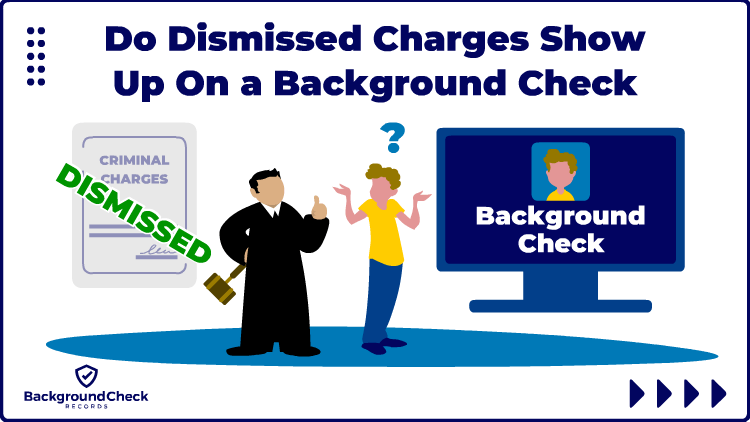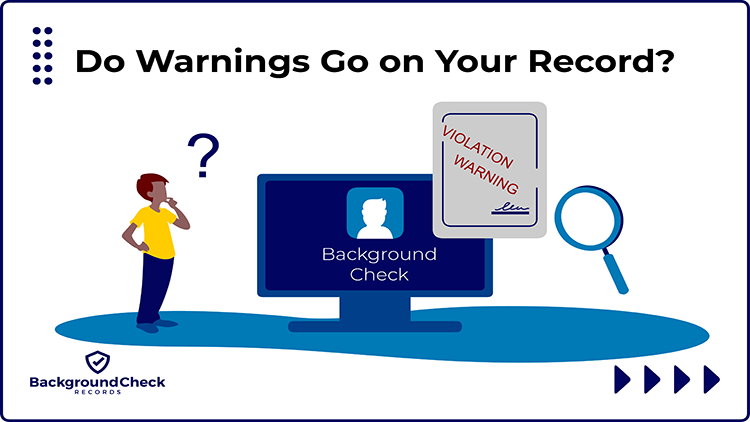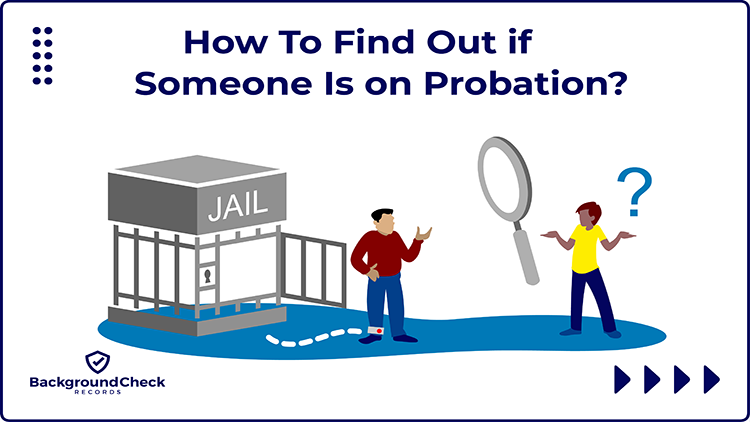Do Dismissed Charges Show Up on a Background Check? Misdemeanors?
Dismissed charges are usually a part of public record and can be searched like any other criminal record. However, state specific laws surrounding discrimination, expungement, and record sealing affect if dismissed misdemeanors and felonies show up on a background check, and for how long.
To avoid negative impacts of passing a background check, concerned applicants can check to see if a background checks shows dismissed charges for free by filling out the search form.
Or, they can learn about their state specific statutes below to determine how certain charges such as misdemeanors and felonies are handled in addition to how to remove them from public records and subsequent background checks.
If Charges Are Dismissed, Does It Show Up on a Background Check?
Criminal charges range from infractions, to misdemeanors and even felonies where misdemeanors are considered less serious criminal offenses and felonies being more serious offenses – in either case their impact can be very detrimental to a person’s future. Even when charges are dismissed, there is potential to cause harm if it shows up on a background check. In most cases, unless a charge is expunged or sealed, it can and does appear on a record check.
Some states have taken steps to prevent dismissed misdemeanors from appearing on background reports. The way these dismissed charges can be used is also limited so it’s best to look into misdemeanors and felonies separately before delving into state specific laws on both.
Does a Dismissed Misdemeanor Show Up on a Background Check?
Misdemeanor charges, even when dismissed, have the potential to show up on a background check. As outlined in the table above, some states have automatic expungement or sealing of misdemeanor dismissals, which makes them inaccessible on non-criminal justice background checks. Other states require the defendant to petition the court to have the matter sealed or expunged.
When the dismissed charge does appear on a background check, it shows there was not a conviction in the matter. Also, in states that have a waiting period, such as Wyoming, the dismissed charge will initially show up on a background check but will drop off once the waiting period has expired.1
Can a Background Check Reveal Dismissed Felonies?
Because felonies are more serious in nature than misdemeanor charges, a dismissed felony may not be eligible for sealing or expunging. As with misdemeanor dismissals, however, the disposition that appears on the background check shows there was no conviction.
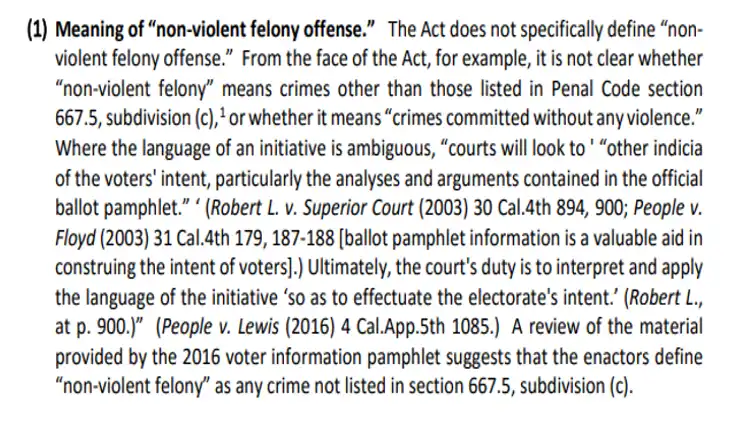
States laws are continually evolving to include dismissed felonies in the list of matters available to be expunged or sealed when no conviction or no true bill is entered. As of November 2021, only five states included automatic relief for certain non-violent felony offenses; These states are:
- California
- Connecticut
- Michigan
- New Jersey
- Delaware2
Can You Pass a Background Check With a Dismissed Misdemeanor or Dismissed Felony?
Having a criminal record can damage a person’s chances at employment opportunities and housing; however, there are federal and state laws that protect individuals from discriminatory practices surrounding criminal history. While dismissed charges may show up on a background check, most employers or landlords are more interested in convictions rather than non-convictions.
Title VII of the Civil Rights Act of 1964 is one protection individuals have against misuse of criminal background history.3 The Equal Employment Opportunity Commission (EEOC) provides guidance to employers on how to use criminal history when making decisions.4
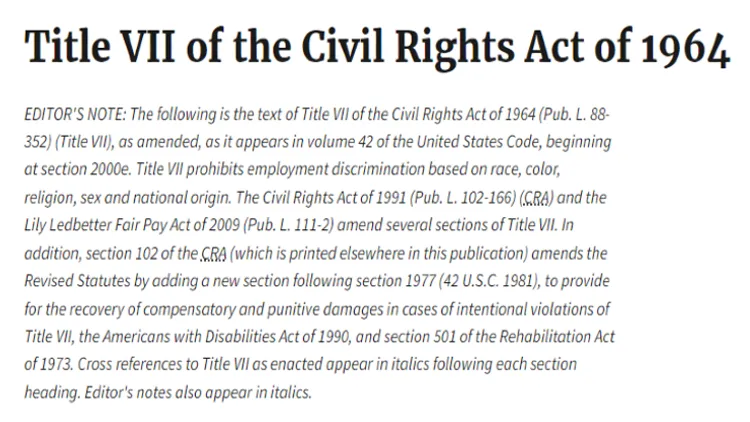
Can You Be Denied Employment for Dismissed Charges?
The EEOC has published guidance for employers on how to use criminal background history when making hiring decisions. In short, employers cannot deny a person a position simply because they have charges on their record, especially when charges have been dismissed.
EEOC guidance states that employers should consider the following when making hiring decisions and weighing a person’s criminal history:
- Nature of the crime and the seriousness of the offense,
- Amount of time that has passed since the charge or the completion of any sentencing, and
- How the offense will directly impact the performance of the job or the nature of the position applied for.
Additionally, employers should note an arrest alone is not proof the person committed a crime. In short, a dismissed charge alone cannot be used to deny someone if the charge appears on an employment background check. If the applicant feels they have been discriminated against and their criminal history was used unlawfully for that purpose, they can contact the EEOC to file a discrimination claim against the employer.4
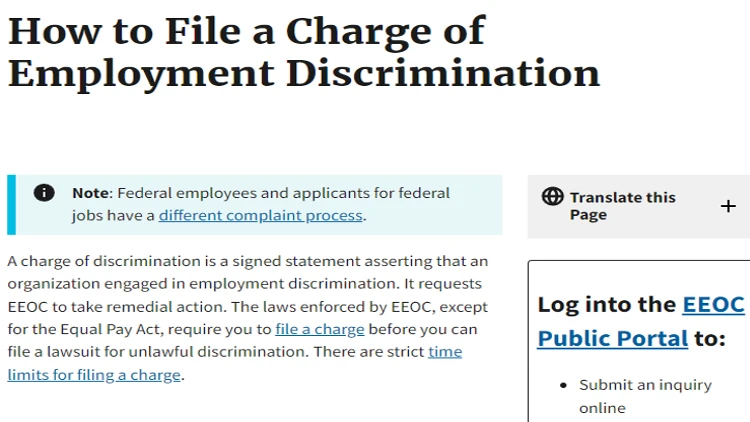
Federal employment also helps protect applicants who have dismissed charges on their record through the Fair Chance to Compete for Jobs Act of 2019 which further limits when and how federal employers can use criminal history when making hiring decisions.5
Will Dismissed Cases Hurt Job Chances?
Dismissed charges do not carry the same weight as convictions on a person’s criminal history and should not hurt a person’s job chances; however, there is the potential that the employer will consider the person’s character in light of the arrest or charges.
Because of this, many states have taken steps to remove dismissed charges and other non-convictions from criminal background checks as a way of giving people a better chance at employment.
State specific searches may not show dismissed charges if that state automatically expunged them; however, an FBI background check may reveal dismissed charges from another state. This includes both dropped and dismissed charges, deferred prosecutions and acquittals.
Dropped vs Dismissed Charges: What’s the Difference & Does It Affect a Background Check?
While dropped and dismissed charges may seem similar, and both initially have the same outcome, there are differences between the two that individuals should be aware of.
Dropped charges typically refer to matters that are brought to the district attorney (DA) or prosecutor to determine if formal charges will be filed. The DA can drop these charges, sometimes referred to as taking steps to withdraw charges, before they make it to the courtroom which leaves them open to be reintroduced in the future.
When the case lacks strength or requires further information, dropped charges often occur. Dropped charges may resurface as pending charges when more evidence is gathered, potentially appearing as non-convictions or leading to an arrest. Pending charges could remain visible until resolved in court, including dismissals or acquittals.
Dismissed charges occur at the hearing level in the court process. Charges can be dismissed at a docket call, which is when the DA reads the list of cases (docket) to be tried in a court that day, after the presentation of motions by the DA or the defense attorney, or following testimony and evidence. This is not the same as a not guilty verdict. Dismissed charges can be with or without prejudice meaning there is a chance some of these charges can be filed again.
Both can show up on a background check unless the matter is resolved in a state that automatically removes non-convictions from the person’s criminal history.
How Long Do Dismissed Charges Stay On Your Record?
Unless the state has automatic expungement or sealing of dismissed charges, the record of the arrest or charge can stay on a person’s record until the defendant petitions to remove or seal the charge. States may also impose a lookback limit on how far employers can search a person’s history, with some using the Fair Credit Reporting Act (FCRA) standard of seven years.
While FCRA deals primarily with credit history, limiting the lookback period to seven years in most cases; it does provide some guidance for states regarding criminal history.
When inquiring about how long a misdemeanor stays on your record after dismissal, keep in mind that some states have adopted the seven-year standard for most criminal history reports. Other states, and certain positions, do not have a seven year lookback limit due to the nature of the position.6
The table below shows how long dismissed charges may remain on a person’s criminal history.
| State |
Length of Time Dismissed Charges May Appear on Background Checks* |
| Alabama |
Indefinitely |
| Alaska |
Indefinitely |
| Arizona |
Indefinitely |
| Arkansas |
Indefinitely |
| California |
1 year from arrest with no formal charges filed
2 years from dismissal of misdemeanors |
| Colorado |
Indefinitely |
| Connecticut |
13 months |
| Delaware |
Indefinitely |
| Florida |
Indefinitely |
| Georgia |
2 years after arrest for misdemeanors
4 years after arrest for non-violent felonies
7 years after arrest for violent felonies |
| Hawaii |
Indefinitely |
| Idaho |
Indefinitely |
| Illinois |
Can be immediately sealed from public view when dismissal entered |
| Indiana |
Indefinitely |
| Iowa |
Indefinitely |
| Kansas |
Indefinitely |
| Kentucky |
30 days |
| Louisiana |
Indefinitely |
| Maine |
Indefinitely |
| Maryland |
Indefinitely |
| Massachusetts |
Indefinitely |
| Michigan |
Indefinitely unless charges are dismissed before trial, at which point the matter immediately falls off the record |
| Minnesota |
Indefinitely |
| Mississippi |
Indefinitely |
| Missouri |
Indefinitely |
| Montana |
Indefinitely |
| Nebraska |
Matter immediately falls off record when dismissal is entered in deferred prosecution when terms are successfully completed. |
| Nevada |
Indefinitely |
| New Hampshire |
Indefinitely |
| New Jersey |
Can be immediately sealed from public view when dismissal entered |
| New Mexico |
Indefinitely |
| New York |
Can be immediately sealed from public view when dismissal entered |
| North Carolina |
Can be immediately sealed from public view when dismissal entered for cases heard on or after 1 December 2021. |
| North Dakota |
Immediately following dismissal, matter is only available to law enforcement and court personnel. |
| Ohio |
Indefinitely |
| Oklahoma |
Indefinitely except first time drug offenses with successful completion of deferred prosecution. |
| Oregon |
Indefinitely |
| Pennsylvania |
18 months |
| Rhode Island |
Indefinitely |
| South Carolina |
Summary court dismissals fall off public record immediately following entry of action. |
| South Dakota |
12 months |
| Tennessee |
Indefinitely |
| Texas |
Indefinitely |
| Utah |
Courts can expunge dismissals upon entry of the dismissal for offenses heard on or after 1 May 2022. |
| Vermont |
60 days |
| Virginia |
Indefinitely |
| Washington |
Dismissed matters do not show up on non-criminal justice background checks |
| West Virginia |
60 days |
| Wisconsin |
Indefinitely |
| Wyoming |
180 days |
For states where dismissed charges can stay on a record indefinitely, this only applies to those charges that have not been sealed or expunged following the defendant’s petition to the court for relief.
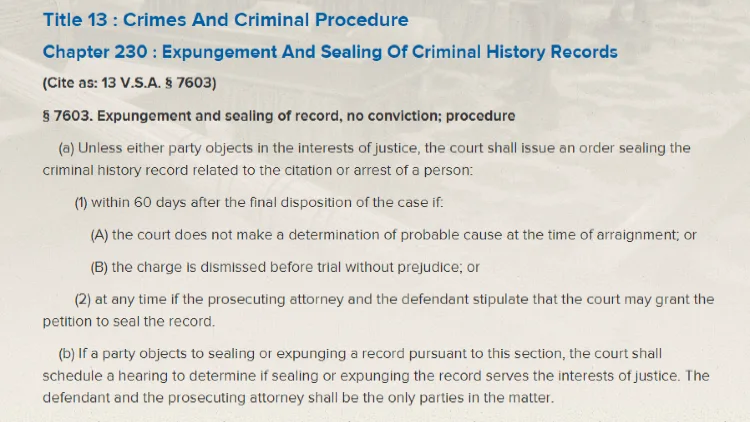
Dismissed Misdemeanors and Expungement
In most states, unless the defendant petitions to the court to expunge or seal the dismissed misdemeanor charges, they will still show up on a background check. Some states have taken steps to include automatic sealing or expungement of dismissed misdemeanor and felony charges. These states are: California, Georgia, Illinois, Nebraska, New Jersey, New York, North Carolina, North Dakota, South Carolina, Utah, and Washington.
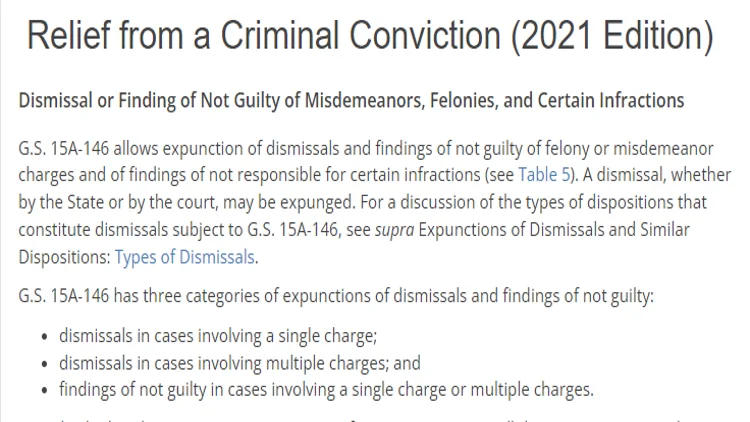
There are some limitations even in states with automatic expungement laws; however, these states have passed other legislation to help protect individuals when a background check is conducted.
How Ban the Box Laws Affect Dismissed Charges on Background Checks
Ban the box laws are state and federal statutes designed to give individuals with a criminal history a fair chance at employment. Limitations placed on employers can prohibit the employer from asking about criminal history until a conditional job offer has been extended, removing questions on applications regarding criminal history, and imposing lookback periods for using the record.
The federal Ban the Box law is the Fair Chance to Compete for Jobs Act which prohibits federal employers from asking about a person’s criminal history until a conditional job offer has been made. It also requires applicants are made aware a background check will be conducted and obtain consent for a background check.7
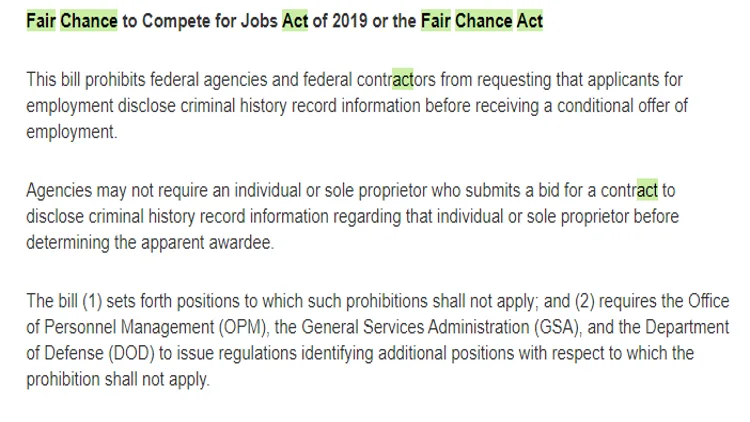
The states listed below have also enacted Ban the Box legislation to help protect individuals with a dismissed misdemeanor on their criminal record.
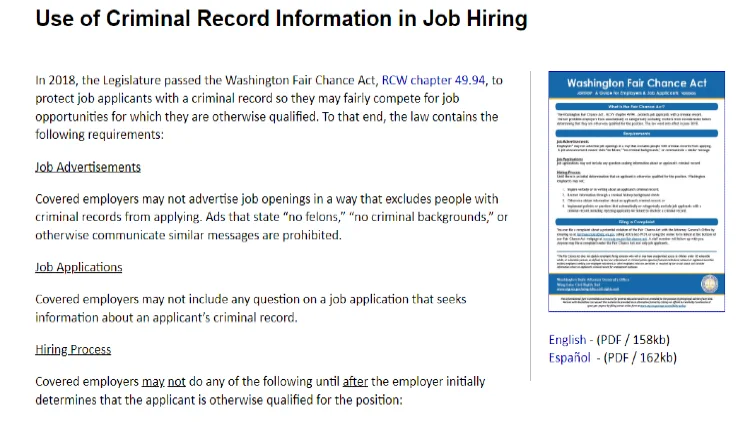
Ban the Box laws are designed to help those with a criminal history obtain gainful employment which has been shown to help prevent reoffending. Even in states without ban the box laws, if charges are dismissed a person can answer the questions on the application regarding criminal convictions with “no.”
How To Remove Dismissed Charges From Your Record So They Don’t Show Up on a Background Check (State Laws & Procedures)
If any of the statutes above did not exclude your charge from a background check there’s ways to get dismissed misdemeanors and non-violent felonies off your record.
The table below is laws, guidance, and statutes on how to remove dismissed charges on your record in each state so you don’t have to worry about it on future background checks:
| State Specific Laws and/or Guidance About How Dismissed Charges Are Treated |
Brief Explanation of Law, Guidance & Procedures |
| Alabama |
Defendant must petition the state to seal or expunge non-convictions |
| Alaska |
Alaska does not expunge dismissed charges from the public record. The defendant can submit a request to seal the record to the Alaska Department of Public Safety. |
| Arizona |
Defendant must petition the state to seal or expunge non-convictions |
| Arkansas |
Defendant must petition the state to seal or expunge non-convictions |
| California |
Labor Law 432.7 prohibits dismissed charges from appearing on a background check. |
| Colorado |
The judge can seal the record immediately following the dismissal or acquittal or upon motion by the defendant to seal the record. |
| Connecticut |
Defendants may petition the court 13 months following the dismissal to have their records erased. |
| Delaware |
Delaware has options for mandatory and discretionary expungement of records. Mandatory expungement is available for misdemeanors and felonies disposed of in the defendant’s favor such as a dismissal. |
| Florida |
Defendant can petition to seal a matter immediately following dismissal, and then petition to completely expunge the record 10 years after it has been sealed. |
| Georgia |
Dismissed charges are automatically restricted from public view once the case is disposed of in the defendant’s favor at the arresting agency. Court records can be restricted upon petition to the court to seal or expunge the record. |
| Hawaii |
Access to dismissed cases is automatically restricted to law enforcement and governmental agencies in digital form. Paper copies from the court house can be restricted from public view following an application to the Attorney General by the defendant to expunge the record. |
| Idaho |
One year after the dismissal, the defendant can request the state police seal the record. |
| Illinois |
The court must advise a defendant of their right to petition to seal a dismissed charge immediate following entry of the dismissal in court. |
| Indiana |
Courts must expunge dismissals upon entry of the dismissal. |
| Iowa |
The defendant or prosecutor can petition for dismissals to be expunged. The court can also expunge the record on its own motion in a dismissal. |
| Kansas |
Defendant must petition the state to seal or expunge non-convictions |
| Kentucky |
Cases dismissed with prejudice on or after 15 July 2020 are automatically expunged 30 days following the action. |
| Louisiana |
Defendant must petition the state to seal or expunge non-convictions |
| Maine |
Dismissed case information held by law enforcement agencies must be confidential; however, court records are not. |
| Maryland |
Beginning 1 October 2021, dismissed cases will automatically be expunged 3 years after the entry of the dismissal. |
| Massachusetts |
The court can order dismissed cases be sealed by the clerk upon entry of the dismissal if it best serves the public interest to do so. |
| Michigan |
Per Michigan law, when cases are dismissed, Michigan State Police must destroy all arrest and biometric records, and the courts have adopted the same practice for dismissed cases regarding court documentation. |
| Minnesota |
Defendant must petition the state to seal or expunge non-convictions |
| Mississippi |
Defendant must petition the state to seal or expunge non-convictions |
| Missouri |
Records are sealed to the general public, but are available to law enforcement and governmental agencies for cases where charges were dismissed |
| Montana |
Statutes only address sealing dismissals as a result of deferred prosecutions, making them accessible only to law enforcement or governmental agencies. |
| Nebraska |
Dismissals are automatically sealed from public view and only available to law enforcement agencies. |
| Nevada |
Dismissals are eligible to be sealed 8 years after the action or when the statute of limitation has been reached or as stipulated by both the prosecution and defense. |
| New Hampshire |
Dismissed cases on or after 1 January 2019 are automatically annulled. Cases before that dare require the defendant to petition the court to annul the dismissed case. |
| New Jersey |
Dismissals are automatically expunged following final disposition. |
| New Mexico |
Defendant must petition the state to seal or expunge non-convictions |
| New York |
Allows for the automatic sealing of dismissed cases, and the destruction of all records held by law enforcement agencies pertaining to the dismissed case. |
| North Carolina |
Charges dismissed on or after 1 December 2021 are automatically expunged. Offenses dismissed prior to that require a petition to the court. |
| North Dakota |
Defendants can request court limit access to the individual’s online court record when the charges are dismissed. |
| Ohio |
Defendants can petition to seal dismissed cases immediately following the disposal of the case. |
| Oklahoma |
Dismissals are automatically expunged following final disposition, only if the person has never been convicted of a felony and has no pending charges. |
| Oregon |
When charges are dismissed, the defendant can submit an application to the court to have the record of arrest set aside at any time after the dismissal. |
| Pennsylvania |
If, after 18 months from filing the charge, a disposition is not entered (the case is dismissed) the record must be expunged. |
| Rhode Island |
Defendant must petition the state to seal or expunge non-convictions |
| South Carolina |
Dismissals in summary court are automatically expunged. |
| South Dakota |
Records can be expunged one year following dismissal of the charges if the court does not deem it will impact public safety to expunge the record. |
| Tennessee |
Defendant must petition the state to seal or expunge non-convictions |
| Texas |
Records can be expunged in cases where no conviction results, including dismissals. Defendant must petition the court to request expungement. |
| Utah |
Effective 1 May 2020, all charges that are dismissed are eligible for automatic expungement. |
| Vermont |
Dismissals can be automatically expunged 60 days following the action unless there is objection by either party. |
| Virginia |
Defendant must petition the state to seal or expunge non-convictions |
| Washington |
Dismissed case records can only be used for criminal justice purposes. |
| West Virginia |
Defendants must petition the state to seal or expunge non-convictions 60 days after the action. |
| Wisconsin |
Fingerprint records have to be returned to the defendant upon request in dismissed charges, but the statutes do not specifically mention court records. |
| Wyoming |
180 days after the dismissal, the court will automatically expunge the record unless the prosecutor objects. A hearing will determine if the dismissed charge record should be expunged in those cases. |
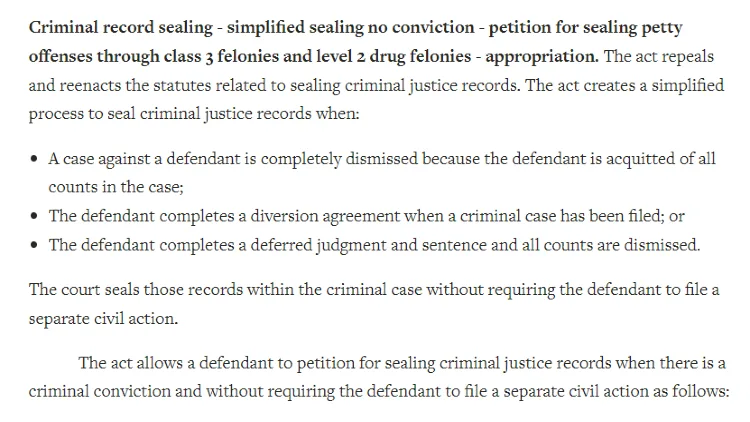
A criminal history can have a major impact on a person’s ability to obtain employment, licensure, and rent or lease a house or apartment, leading the applicant to wonder what chances they have. Dismissed charges for misdemeanors or felonies can indeed show up on a background check, though they don’t necessarily indicate closed doors to opportunity.
Frequently Asked Questions
Do Dismissed Charges Appear on a Background Check?
Unless the state allows for automatic erasure or expungement of dismissed charges, they will appear as a non-conviction on a background check until the defendant petitions the court to seal or expunge the record.
What Is the 7 Year Standard for Background Checks? Does it Apply to Dismissed Charges?
The 7 year standard for background checks refers to the FCRA guidance regarding credit history which includes civil cases. Many states have also adopted this same standard for criminal background checks; therefore, dismissals that are less than 7 years old have the potential to show up on background checks as non-convictions.8
What Is the Difference Between Dismissal vs Expungement?
When a charge is dismissed, that means it shows on a record check as a non-conviction. Expungement permanently removes the dismissed charge from a person’s criminal history as if the offense never occurred.
1 TITLE 7 – CRIMINAL PROCEDURE CHAPTER 1 – GENERAL PROVISIONS 7-1-101. Payment of costs accruing from change of venue. The costs. (n.d.). Wyoming Legislature. Retrieved October 7, 2022, from <https://wyoleg.gov/statutes/compress/title07.pdf>
2 50-State Comparison: Expungement, Sealing & Other Record Relief. (n.d.). Collateral Consequences Resource Center. Retrieved October 7, 2022, from <https://ccresourcecenter.org/state-restoration-profiles/50-state-comparisonjudicial-expungement-sealing-and-set-aside/>
3 Title VII of the Civil Rights Act of 1964 | U.S. (n.d.). Equal Employment Opportunity Commission. Retrieved October 7, 2022, from <https://www.eeoc.gov/statutes/title-vii-civil-rights-act-1964>
4 Arrest and Conviction Records: Resources for Job Seekers, Workers and Employers. (n.d.). Equal Employment Opportunity Commission. Retrieved October 7, 2022, from <https://www.eeoc.gov/arrestandconviction>
5 Fair Chance Act (Ban the Box) – OCWR. (2021, December 20). Office of Congressional Workplace Rights. Retrieved October 7, 2022, from <https://www.ocwr.gov/employee-rights-legislative-branch/ban-the-box/>
6 Employer Background Checks and Your Rights | Consumer Advice. (n.d.). Federal Trade Commission. Retrieved October 7, 2022, from <https://consumer.ftc.gov/articles/employer-background-checks-your-rights>
7 Johnson, S. (n.d.). Text – S.387 – 116th Congress (2019-2020): Fair Chance Act | Congress.gov | Library of Congress. Congress.gov. Retrieved October 7, 2022, from <https://www.congress.gov/bill/116th-congress/senate-bill/387/text?q=%7B%22search%22%3A%5B%22Fair+Chance+Act%22%5D%7D&r=1>

